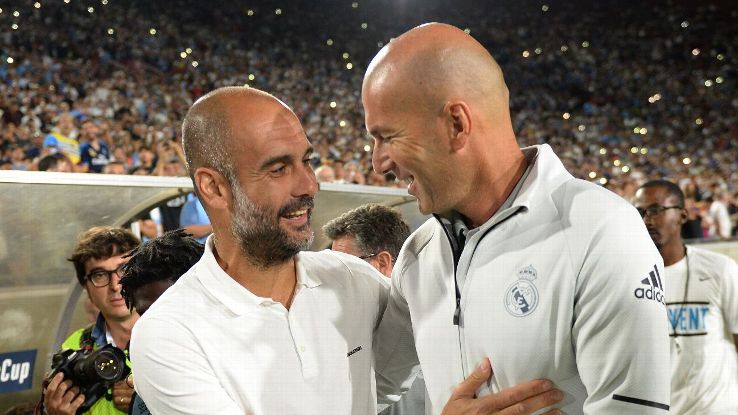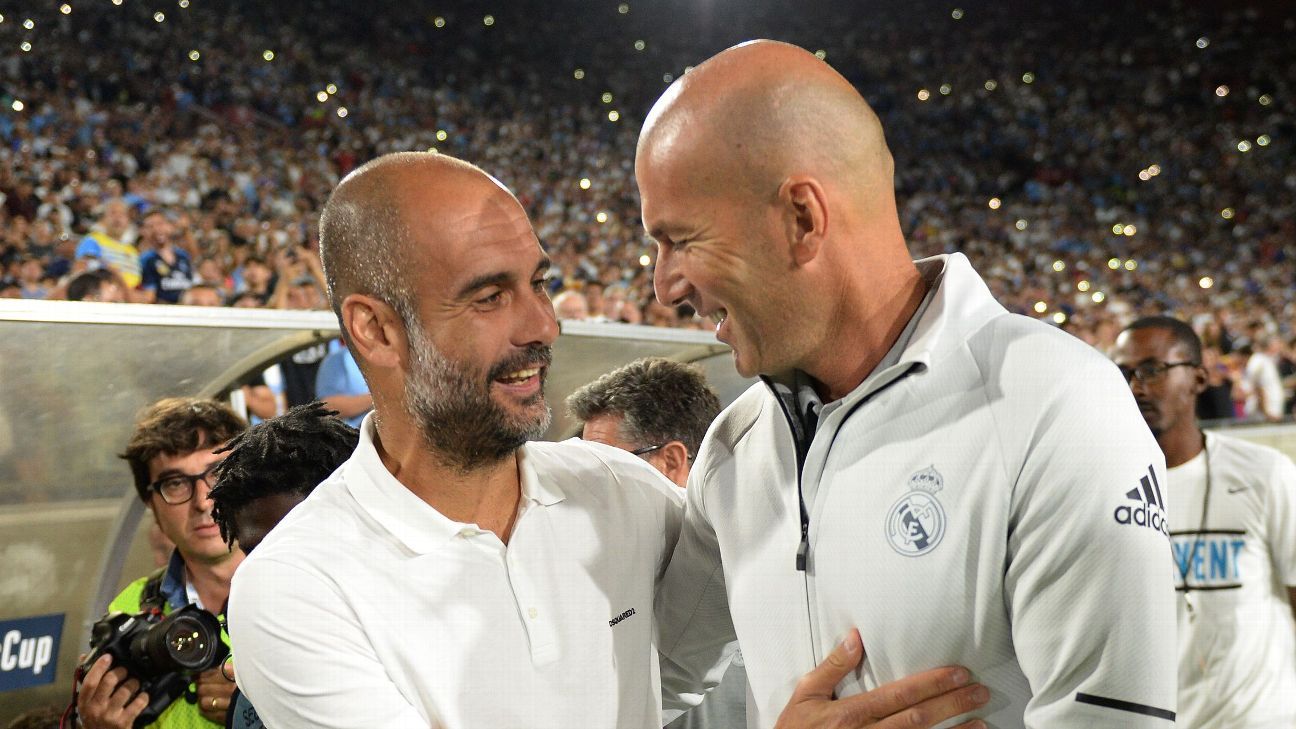Products You May Like
The marker for the prematch atmosphere ahead of Real Madrid hosting Manchester City on Wednesday at the Santiago Bernabeu was set last week. When Atletico Madrid’s fans mobbed their team ahead of Liverpool’s visit to the Wanda Metropolitano, spewing out love and desire for victory amid a vast cloud of red smoke from many dozens of incandescent flares, you can bet that Madrid’s fans were taking note and promising: “We’ll do it better next week!”
Ordinarily, the atmosphere before Los Blancos play at their ancestral home is genteel. The Bernabeu is in a well-to-do area of Spain’s capital; the bars, cafes and restaurants are quite posh and the stadium becomes temporary home to an amazing mix of families, often three generations watching together, well-heeled, cigar-smoking fans, many thousands of tourists … and Madrid’s ultras.
But then along comes an important night-time match, like this. Particularly one in which the opposition is coached by someone the Bernabeu both fears and loathes: Pep Guardiola.
When the corporate-emblazoned coach carrying Zinedine Zidane & Co. heads along the Avenida Concha de Espina — which borders the stadium’s southern side — toward the player entrance on Calle Padre Damian, it’ll be at walking pace. Massed around them will be thousands of rabid, noisy, loyal, flare-wielding fans exhorting not just victory against upstart City but demanding undying, lung-busting effort from every last man onboard the vehicle. It’s non-negotiable.
More, much more, than the stadium atmosphere, these magical, crazed, inspirational moments in any player’s career can inject a core of adrenaline and steely determination that might just, on a given night, tip the balance from competitor to winner.
Inside Los Blancos‘ citadel, I hope the cacophony of noise — a mixture of defiance and demand — reaches the level of the night most seared on my mind: Tuesday, April 8, 2003, when Madrid tore Manchester United apart and won 3-1. Everyone seemed to temporarily lose their minds, or at least all inhibitions, that night — kids, tourists, old men and women, everyone jumped up and down all night, the roaring and the bouncing literally seeming to make the Bernabeu rock to its foundations. It was truly amazing.
The stadium itself is undergoing reconstruction and modernisation right now. Certain areas are already restricted; development on this magnificent beast of an arena is well underway but huge tranches of work remain before the vast exterior of Madrid’s stadium is transformed into what will look like a giant Wi-Fi router and the inside is fully covered by a roof.
It’s a work in progress, metaphorically perfect for Madrid as a team. They, too, have grand designs on the future, but some wires are exposed, the foundations aren’t fully laid and there are inspections to do.
When Zidane was training to be a coach, he was quite certain whom he had to visit — and from whom he should learn. It was Guardiola, then coach at Bayern Munich.
The Frenchman called his Catalan counterpart “an inspiration” and led a delegation of French Football Federation coaches to go study at Bayern’s Sabener Strasse training centre. There he got to know properly, for the first time, a guy who’d dedicated an entire chapter of his 2001 autobiography to his reverence for Zidane the player. That study visit happened in March 2015. Guardiola wasn’t to win the Champions League while working in Bavaria, beaten in three semifinals and always by Spanish teams.
But 15 short months later, Zidane had won the Champions League as coach of Madrid. Then he retained that trophy for two consecutive years. The guy who was an apprentice at Sabener Strasse only five short years ago is now the only man to win three straight Champions Leagues and, if you count his medal as assistant to Carlo Ancelotti in 2014, he’s actually coached his way to this trophy twice as many times as Guardiola.
City come into this test bristling with focus and motivation. Their dream of a hat trick of Premier League titles has been obliterated by the footballing Terminators from Liverpool and now UEFA have handed them a two-year ban from this competition. Talk about incentive to win.
Madrid, on the other hand, have become suddenly vulnerable. Humiliated at home in the Copa del Rey, league leadership lost in the space of eight days thanks to five dropped points in two matches and neither sufficiently sharp up front nor as miserly at the back as has been the case for weeks.

Right now, Zidane isn’t brutally debilitated by injuries, but Eden Hazard was to be the locksmith who unpicked Fort Knox defences. The Belgian’s horrible ankle injury means that subtlety is no longer an option — Madrid will have to dynamite their way to fame and fortune.
Madrid’s best available 11 is: Thibaut Courtois; Dani Carvajal, Raphael Varane, Sergio Ramos, Ferland Mendy; Luka Modric, Casemiro, Federico Valverde, Toni Kroos; Karim Benzema and Vinicius Jr. No question. Their most adventurous XI would be the same back five plus Kroos, Casemiro and Valverde, with Vinicius and Benzema plus either Gareth Bale or Isco in a 4-3-3 formation.
And Isco has skin in this game. When Zidane reprimanded Florentino Perez, as Madrid’s director of football rather than their coach, and pretty much ordered Madrid’s president to sign Isco, City had the midfielder’s flight plan, welcome party and kit sizes all planned. Manuel Pellegrini was the coach, City were convinced that they were going to profit from Malaga’s fire sale, but Zidane’s huge regard for the Andalusian magician nipped that in the bud.
Almost 300 matches, 15 trophies and regular smatterings of magic on pitches around Europe later, Isco has repaid that faith. But whenever his place at the club has been in jeopardy and Perez has tried to cash in on him, Guardiola has made it crystal clear that City are no longer interested. Isco dwells on the ball too long, twists and turns habitually rather than Guardiola’s pass-move-pass-move-score tempo. Is that enough to persuade Zidane that Isco should start instead of Modric or Bale with a mission to stick it to City and their Catalan coach?
As for Guardiola, what does it mean to take another side to the Bernabeu? It’s a place that, in his early years, held nothing but disappointment and footballing horror for him. By the time he was 20, and a fixture in Barcelona’s midfield, he’d only seen the Blaugrana win the title twice in his lifetime — Madrid 11 times. During those two barren decades at the start of his life, Barca won just four times at the Bernabeu.
Guardiola’s own debut at Real Madrid’s palatial stadium was in October 1991, and that 1-1 draw sported many faces associated with this tie 29 years later. Madrid’s match delegate, Chendo, was full-back that day. Los Blancos‘ head of institutional relations, Emilio Butragueno, was up front for Raddy Antic’s team. Luis Enrique, the Spain manager who’ll be in the main stand, was on Madrid’s bench. Barcelona’s winger that night, Txiki Begiristain, is City’s director of football.
Guardiola and Zidane have perennially followed different paths.
As footballers, the Catalan was the ultimate system player, Zidane the swashbuckling individual. They never played against each other in a Clasico, the former leaving Spain pretty much as Zidane finally followed Guardiola’s perpetual advice that he needed to play in La Liga. Once, for their clubs, they faced off at the Bernabeu, but Guardiola was in the red and gold of AS Roma. For 24 minutes, after he came on at half-time and before Madrid’s No. 5 was rested in the 70th minute of a 3-0 thrashing imposed on Fabio Capello’s Serie A side, the Catalan tried to put the clamps on this French footballing phenomenon he admires so much.
As coaches, their trajectories are divergent, too.
Guardiola, again, the man with a plan: systematic, Johan Cruyff football where nothing is ever more important than possessing the ball, using it strategically and then imposing superiority. Zidane is not a tactic-free zone, but he’s someone for whom the ability to inspire men in training, to consistently draw out their best — because he’s been there and knows how they tick — how to make them render their maximum, has become his trademark.
Which school will win here? Is it influential that, for City, this tie is everything and they’re up against rivals who are a work in progress? All or nothing versus all over the place?
Can Madrid cast aside their sudden vulnerability and impose themselves, even 1-0 like the last time Guardiola took his team (Bayern) to this totemic European stadium in April 2014?
Please, promise me that you’ll be watching for Part I of this magnificent contest that has so very much riding on it. Not to mention two majestic men of modern football jousting against each other for the first time as coaches.
